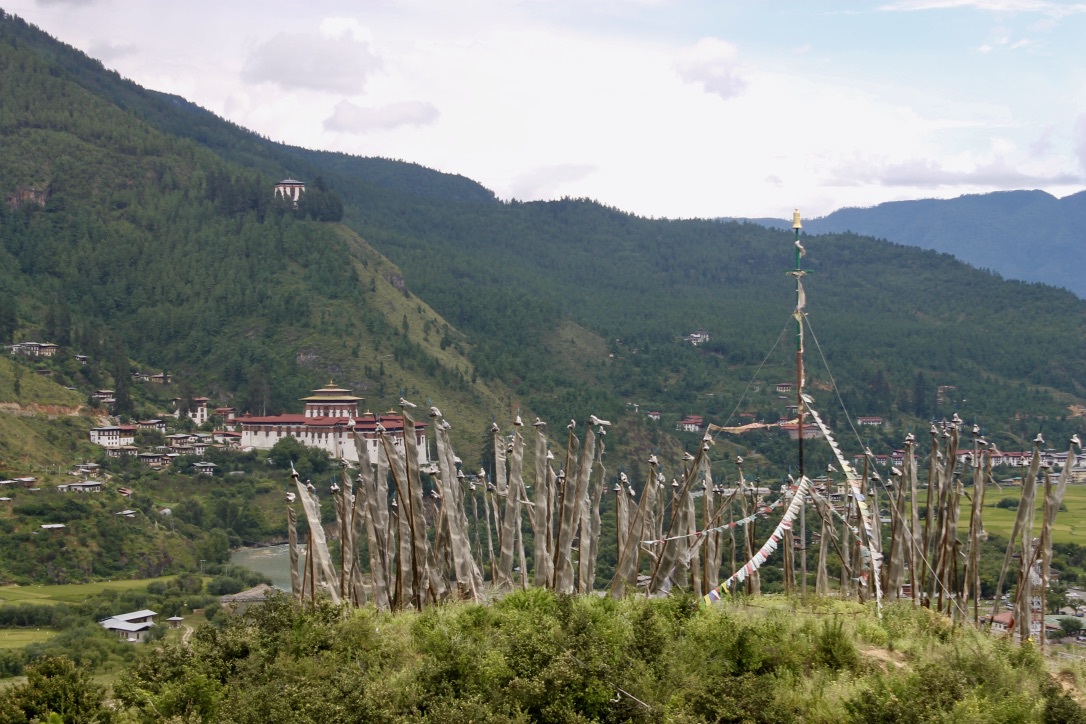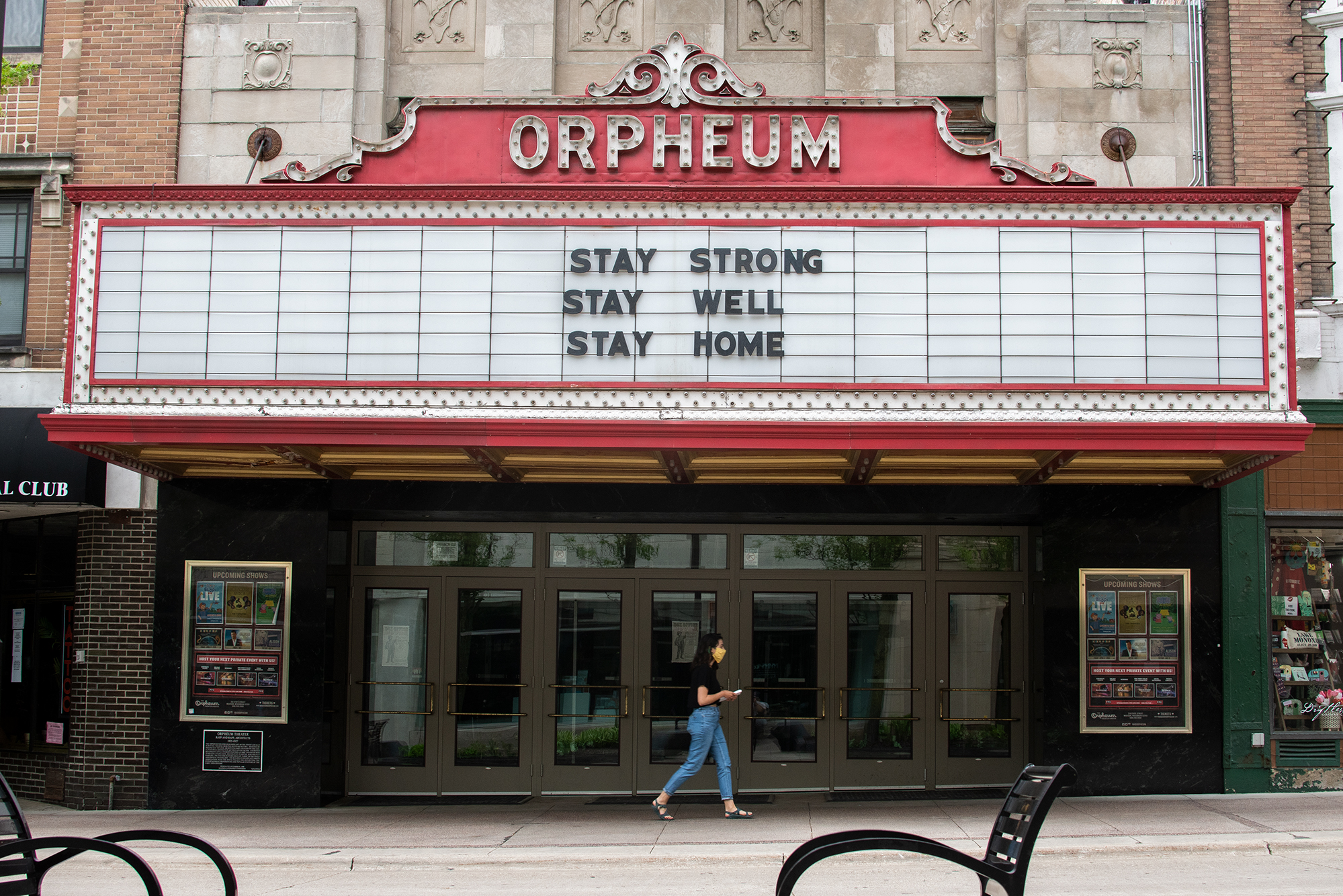
The fire popped loudly, startling the people standing nearby. It was crowded at the cremation ground next to the river, just outside downtown Thimphu, the capital of Bhutan. It's the spring of 2018. Men in dark ghos with shiny dress shoes and women in muted but elaborate kiras mingled around the fires, catching up. Elaborate, colorful offerings of food and flowers decorated the table in front of the pyre. The fire would burn for many hours as it turned the skin and bones of my colleague's father into ash.
A lot of white dots the hills of Bhutan, especially near rivers. The deceased's family will choose a spot to erect 108 tall wooden poles with long white cloths, each one covered in prayers written in small black script to the Bodhisattva of Compassion. The flags are dedications to those who have been lost. As wind rustles the cloth, it carries prayers away on its breezes. The rivers will carry the prayer winds even farther, winding their way through the land.
A feast was laid out on a long set of tables under the colorful ceremonial tent, ready to feed the hundred or so people who were here to see the dead on their way. The clink of plates rose in a cacophony. There was barely any room to sit. People crouched on the floor, balancing bowls on their knees or lap while they scooped rice and hot chilies into their mouths with one hand. For the Bhutanese, remembering a life is also a time to gather as a community.
Buddhists believe that one accumulates merit in life by doing good deeds and being a good person. The more merit one has, the closer to enlightenment. If you don't reach it, you are reborn. What form your reincarnation takes depends on the karma and merit you accumulated. For seven weeks after death, the family spends hours with monks, praying and giving offerings to the gods, providing support and guidance to their loved one as they make this transition. The murmurs of prayer from the small temple room near the pyres mingles with the rush of the river.
After many hours, all that was left of the body was ash. Often, these are collected and mixed with mud to form a small stupa, or shrine, called a tsa-tsa. The family will place these in sacred places to help the spirit depart this world and enter an in-between place called the bardo. The soul will stay there for 49 days–seven weeks–a time when the soul may be encountering great frights as it navigates the transition. In the living world, the family must perform regular rituals to send prayers and strength to the soul during these challenges. Only after 49 days do Bhutanese Buddhists believe that the soul has passed through the bardo and has been reborn.
Two years later, I am struck with the care, love, and time that go into celebrating and commemorating the life of a Bhutanese Buddhist who has died. The family organizes a gathering, a feast, offerings, wood, fire, the time of 49 days, prayers and prostrations over days and weeks and months. It is a labor of love and devotion, to both the person and to Buddhist traditions.
Thinking about these rituals also makes me think about my grandfather, Rudy Horenstein. Rudy was just 16 when World War II started, a death sentence for him and his family, who were Polish Jews. He survived the Holocaust with a mix of ingenuity and luck, forced into a labor camp rather than a death camp before being liberated by the Allies in 1945. From there, he was fortunate enough to emigrate to the United States with his new wife and start fresh in New York.
When he died in 2015, I was in North Carolina. I flew to Long Island the next day—Jewish burials are supposed to happen as soon after death as possible. Standing beside his grave on that gray day, my dad, mom, brother, and I each left a small rock on top of his tombstone. It's an ancient Jewish tradition to say, "You are remembered." I now connect the practice with the white flags in Bhutan. A physical way for people still alive to help the dead with whatever's coming next.
The care of the Bhutanese rituals and ancient Jewish traditions stand in sharp contrast to the millions who died in the Holocaust and whose stories were never told, whose deaths were never honored. What became of their souls?
And then, of course, I think of the present.
In a pandemic, there is no time, no safety procedures, not enough people to ensure the smooth passage of the dead into the next life. Families cannot bid final goodbyes to their loved ones or care for their bodies after they pass. The names of those we've lost to the coronavirus keep piling up until their stories are buried under the sheer weight of all who are gone.
What will happen to our dead if we aren't able to perform the necessary rituals? What will happen to all of us, dead and alive, when we cannot gather to celebrate the lives of those lost?
Bhutan hasn't yet had a coronavirus death, but it's only a matter of time. The country's borders have been closely monitored for months now—no tourists, controlled crossing over the usually fluid border with India. Eventually the borders will reopen for tourism and other trade and travel. All it might take is one positive person coughing in the crowded capital. What happens when the bodies start piling up because the fires can't burn quick enough? Will the dead survive the bardo without community prayers and offerings? Can people be reborn if the correct death rituals and traditions cannot be followed?
I worry about dying.
I worry that our stories will be lost in the chaos of the living world and our souls will be lost in the realm of the dead.
At least in Bhutan, people's souls will always have some guidance: 108 white prayer flags, set into the Bhutanese hillside, sharp against the bright blue sky.










